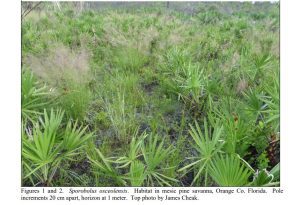Controlled Arboretum Burns Lead to Discovery of new Grass Species

Credit: James Cheak
A new grass species was discovered in the UCF Arboretum thanks to regular controlled burns that mimic nature’s wildfire season.
Sporobolus osceolensis is a type of dropseed grass sensitive to fire-stimulated flowering, according to Florida ecologists Edwin Bridges and Steve Orzell, who identified the blooming grass in 2018 on one of UCF’s prescribed burn sites. The pair published their official findings earlier this year in the digital publication Phytoneuron.
It was former land manager of the UCF Arboretum Ray Jarrett who originally noticed the inconsistent grass flowering among other dropseed grass species. Program Director Jennifer Elliott notes that the discovery of Sporobolus is owed to this moment.
“I remember Ray coming into the office and telling us he found something different,” said Elliott. “That’s when Bridges and Orzell were contacted for identification and we were all so excited about it.”
The two have been working together to find this specific type of Sporobolus since 1999, when they first discovered it growing with other Sporobolus species after a major wildfire in Osceola National Forest.
“We went into the field with the knowledge that this species could exist in this area, but it wasn’t a guarantee,” said Orzell. “Grasses are inherently difficult for botanists to identify, especially because very few people study it in detail. There is a lot we don’t know.”
Controlled burns, also known as prescribed burns, are controlled fires applied for the purpose of managing ecological areas, restoring prairies and reducing wild forest fires.
The UCF Arboretum is one of the only institutions in Florida that conducts these burns on campus both to reduce wild fire risk and to improve flowering and blooming of natural ground covers that drive much of the biodiversity in the species-rich ecosystems on campus.
“It’s tedious work and many institutions don’t want to take the time, risk or cost associated with conducting prescribed burns,” said Bridges. “UCF Arboretum took a chance when no one else would. Because of that, we are seeing a major pay off.”
Fire management encourages the growth of species like the Sporobolus that thrive in burn mediated conditions. Both Orzell and Bridges note that thorough fire management is hard to come by in Florida due to safety concerns and other associated risks.
“It is rare, this species of grass,” said Bridges. “Being keyed into what we were looking for going into the field supported the process, but it is still an unbelievable feeling to know we found a grass that has been hiding from us for years.”
